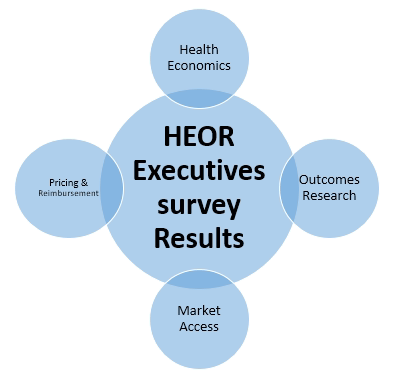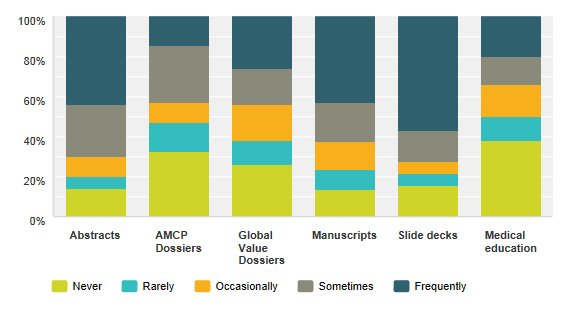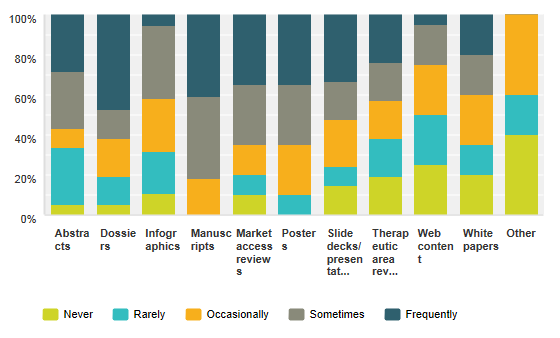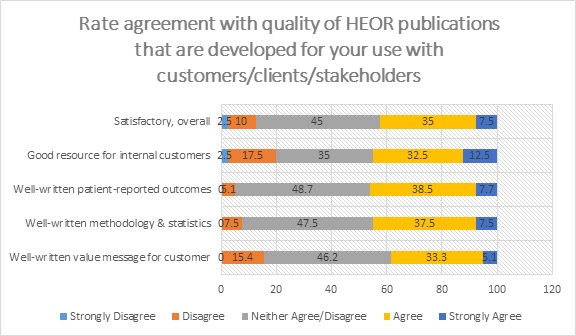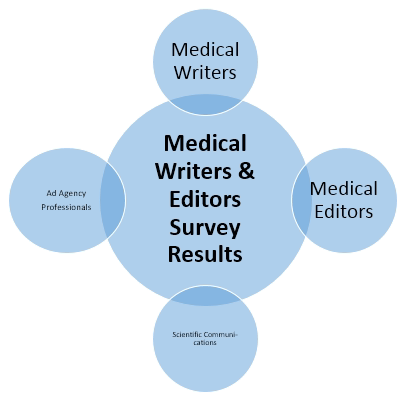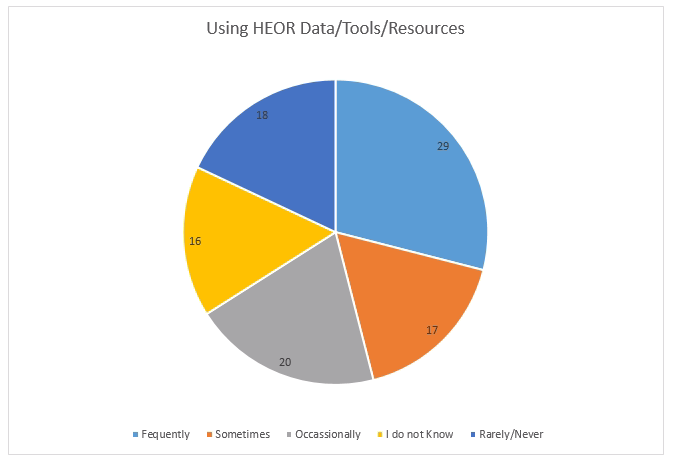SPLAT! How HEOR Communication Tools Fall Flat With Your Customers – But Don’t Have To!
February 3, 2015

Our major customers tell us that HEOR Communication Tools are notoriously variable in terms of quality. Why is this? One reason may be that many companies “farm out” this last step (e.g., taking the research results and translating it into a manuscript, abstract, customer tool, etc.) to an internal or external Medical Communication group, a Scientific Communications agency, or a consultant. The person writing the final document may or may not be educated in HEOR methodology or in stakeholder needs or behavior. Even if they are, your employer may not give you enough time to adequately review final publications on your research, limiting you only to “fact checking” it, without allowing time or market research to verify if the message was right or if the deliverable was persuasive and/or attained your objectives. This process increases the likelihood that your final document – the main communication tool – is not living up to its potential.
Does this sound familiar? It must be frustrating. It was for me, when I ran an HEOR Department for industry more than a decade ago. Sadly, it appears that things haven’t improved much since then. I have always believed that we need to treat that final stage – the translation of our research into actionable messages – with as much integrity and effort as we do the research design. Do you agree?
At HealthEconomics.Com, we want to change this. We believe that HEOR Communication Tools are just as important as the research on which it is based. And most of you agree too, according to a recent survey of 150 professionals in the HEOR and Medical Writing field.
Moreover, this recently-conducted survey let us know that there’s a tremendous amount of discord in our industry about the quality of these communication tools and how we should educate this group to ensure that the final stage of the research process is as successful as the research on which it is based. That’s why HealthEconomics.Com and Global Outcomes Group have partnered together to bring the first training course of its kind to you: HEOR & Market Access Writing and Communications Workshop – More Effective Writing and Communications for Health Outcomes, Market Access, and Value Messaging: A Skills Development Workshop on March 26 (for HEOR Executives) or March 27 (for Medical Writers/Editors) in Philadelphia, Pennsylvania. Won’t you take a look to see if you and your team might benefit?
In this Workshop, you will get….
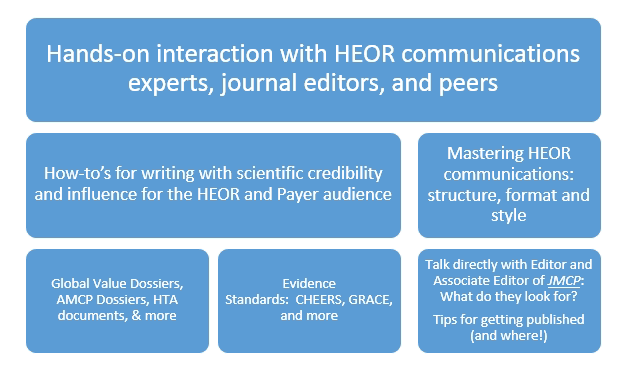
Let’s learn a little more about the industry HEOR Communication Tool trends, based on the Survey by HealthEconomics.Com and Global Outcomes Group. A two track 16-question on-line survey was fielded in July and August of 2014 to approximately 300 HEOR Executives and Medical Writers/Editors to assess satisfaction with the development of HEOR Communication Tools, determine areas of educational need, and interest in a hands-on HEOR Writing and Communications educational program. We received 59 responses from HEOR Executives and 109 responses from Medical Writers/Editors, for a total of 168 unique respondents.
Let’s take a look at the results for the HEOR Executives and then, contrast these responses with those of the Medical Writers/Editors.
HEOR EXECUTIVES SURVEY RESULTS
Among the HEOR Executives, 43% were employed by bio/pharma companies and 23% practiced in a consulting organization. Seventy-eight percent were Manager/Director level, and 20% were VP or higher. Most commonly, respondents practiced within the pharmaceutical industry (43%), followed by consulting (23%), and 50% had >3 years of HEOR work experience.
Internal medical writing teams are used by about one-half (47%) of HEOR Executives. Most typically, they subcontract some or the majority of the writing tasks to outside vendors (62% of respondents). The types of projects most commonly outsourced include Global Value and AMCP Dossiers (45% of respondents), manuscripts (40%), and abstracts (25%). Figures 1 and 2 provide additional insight.
The types of communication tools that are in the cross-hairs of HEOR Executives are pretty consistent. Results indicate that 65% of respondents frequently or sometimes develop or oversee abstracts and slides decks while 60% are involved with manuscripts. About 40% of our respondents are involved directly or in a managerial role with Global Value Dossiers and AMCP Dossiers. Correspondingly, the most sub-contracted documents were Dossiers, manuscripts, market access reviews, and posters.
Medical Education documents are the least likely to have involvement by HEOR, at 30%. I find it very interesting that so little direct attention is given to Medical Education, which includes helping the sales force and internal customers understand the usefulness and impact of HEOR research. We plan to address this issue in the upcoming Workshop, so if you work in the MedEd space, don’t miss the HEOR & Market Access Writing and Communications Workshop – More Effective Writing and Communications for Health Outcomes, Market Access, and Value Messaging: A Skills Development Workshop on March 26 (for HEOR Executives) or March 27 (for Medical Writers/Editors) in Philadelphia, Pennsylvania.
Consistently across several measures, the majority of HEOR Executives responded that they were not satisfied with the quality of writing of their HEOR Communication Tools, as assessed by their level of agreement or disagreement to various statements (Figure 3). In particular, the greatest proportion of respondents disagreed that they had well-written HEOR resources reflecting well-written value messages for use with internal customers (20% of respondents) and external customers (15.4% of respondents disagreed). In contrast, the greatest percentage of respondents agreed that they had HEOR publications with well-written patient-reported outcomes (46.2% Agree/Strongly Agree), followed by well-written methodology and statistics (45% Agree/Strongly Agree). These latter two items are encouraging and probably relate to the fact that these areas share the most in common with typical clinically-focused publications. However, the unique value-messaging associated with specific health economic, pricing, reimbursement, or market access outcomes is where there is a need.
In summary, looking across these measures, executives were “tepid” in belief that they produced satisfactory HEOR publications, overall. Clearly, HEOR Executives desire their medical writers to be better trained with respect to critical areas of communicating the value story for both the internal stakeholders as well as the external decision-maker; and, they desire better scientific expertise vis-à-vis the methodology of HEOR studies. If the Medical Writing teams want to be leaders in this field, there is both a need and opportunity for those who desire to expand their skill set to satisfy the HEOR customer. I think this is great news for the medical writing field. Opportunity and need abound, and the upcoming workshop is where you can begin developing these skills.
For more information on training opportunities, please look into the HEOR & Market Access Writing and Communications Tools Workshop.
MEDICAL WRITERS AND EDITORS SURVEY RESULTS
Of the 109 Medical Writers/Editors who responded to our online survey, 75% have advanced degrees, and about one-half (47%) were freelance writers, while 14% worked in the pharmaceutical industry, and 10% worked within an Agency environment. Results demonstrate very high levels of interest in participating in a Workshop specifically focused on building HEOR writing skills. More than 70% of respondents are involved in an editing role as well as writing, and over 50% are involved in communications and publications strategy development. With this high level of activity focused on message development, coupled with over 40% having a PhD and the majority with >6 years of experience, this is a highly-educated and capable group who can benefit from an expanded skill set specifically in the HEOR value messaging arena.
In contrast to the HEOR Executives, Medical Writers/Editors tend to prefer to keep things in-house, and 44% do not use outside vendors for HEOR writing, and only 15% subcontract HEOR publication and/or communication needs to an outside vendor! As you may recall, the HEOR Executives feel quality of HEOR tools can be improved, so perhaps this approach of keeping work in-house could benefit from a dedicated effort to training employees. If your company would like an on-site HEOR Writing Workshop customized for your employees, contact us!
It is very instructive to see that Writer/Editor respondents welcome further development of their HEOR writing and communication skills; over 70% want to write both more clearly and effectively and over 50% feel they can improve their persuasive writing with additional instruction. In a separate question, we delved into the specific areas of HEOR communication needs and found that three-fourths (76%) have a high or moderate interest in communicating a product’s value and 65% have a high or moderate interest in using HEOR language appropriately (Figure 4).
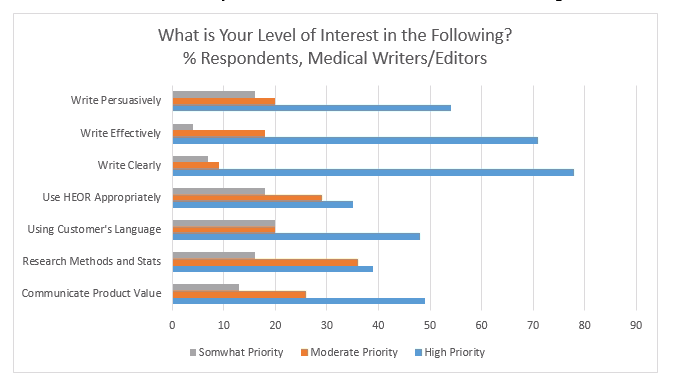
An interesting survey insight relates to the increasing utilization of HEOR content in communications and publications: Medical Writers indicate that 47% of the time customers/clients are using HEOR content (Figure 5). If your customers used something almost half of the time, wouldn’t you make sure what you were providing was A) what they needed? B) impactful? It is our hope that Medical Writers will seek out these educational opportunities to expand their skill set so that they can continue to provide high-quality documents to meet the needs of both external and internal customers.
It is evident by these survey results that HEOR Executives and Medical Writers/Editors believe that continuing professional development in HEOR and Value Messaging Writing skills would be of significant interest and value to their organizations and the success of their marketed products. HEOR Executives strongly believe that there is a need for better trained medical writers, and Medical Writers have an interest in using HEOR language more appropriately and in communicating a product’s value (e.g., clinical, economic, quality of life outcomes). Both groups desire to improve HEOR writing skills to improve effectiveness of publications.

And move your HEOR Communication Tools from Average to Excellent!
I would like to acknowledge the significant assistance of Tom Drake, MA, CMPP, Director of Global Outcomes Group for his assistance in authoring this blog posting, developing the survey, and as the visionary behind the creation and development of the Inaugural HEOR & Market Access Writing Workshop. Both Tom and I would like to acknowledge Amy Smalarz, Strategic Marketing Insight, LLC and Bonny McClain, Grapheme Consulting for their significant roles in the construction, development, fielding and analysis of these two HEOR surveys, as well as their role as esteemed Faculty members presenting at the HEOR & Market Access Writing Workshop.
 |
Patti Peeples, RPh, PhD Founder and CEO www.healtheconomics.com patti@blogsite.healtheconomics.com |
 |
Tom Drake, MA, CMPP Director www.globaloutcomesgroup.com tom@globaloutcomesgroup.com 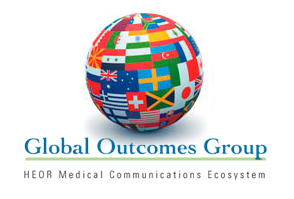 |


